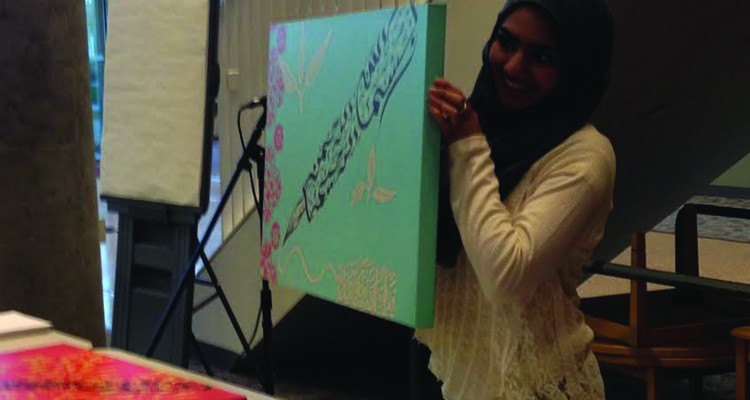Hawzah News Agency-This past week the Muslim Student Association put the light on the Muslim community through Discover Islam Week. Previously referred to as Islam Awareness Week, MSA held numerous events around campus to educate and bring forth a newfound sense of solidarity at Fairfield.
Junior Riham Majeed, Vice President of MSA, stated that the title “Islam Awareness Week” made the religion sound like it had a negative cognition that students should be aware of. The newly titled “Discover Islam Week” defines Islam as something that can be discovered by those who are unfamiliar with the religion.
The events included a Poetry Slam, Calligraphy Night, Hijab Day, an Interfaith Speed-Faithing dinner — which was designed to create open conversation about different religions amongst students — and concluded with Jummah (Friday prayer). Semina Kojic ‘18, treasurer of the MSA, hoped that Discover Islam Week would teach Fairfield students about Islam. Kojic spoke on behalf of the MSA saying they believe that students don’t understand the religion or the Muslim community on campus well enough.
Sophomore Anmol Tabassum, co-president of MSA, also believed that many Fairfield students do not know enough about Islamic culture, saying that they only know what the media tells them.
Given the Islamic State of Iraq and the Levant’s recent attacks on Paris and Belgium, the misrepresentation of Islam is especially relevant now. The media commonly portrays Muslims as attackers. However, Tabassum is hopeful that by learning more about Islam, students will be more open-minded about who Muslims are.
“The media portrays [Muslims] with mostly false information,” she said. “What Islam actually is, what it has and what it is all about, [students] have a lack of knowledge about that.”
Discover Islam Week ushered in a series of events that showed Fairfield students that the media portrayal of Muslims is not true, according to Tabassum.
She explained that events such as Poetry Slam tackled issues of racial profiling and Islamophobia.
Majeed hoped that Discover Islam Week would educate the non-Muslim student population. She said, “One of my biggest things about holding events like this is to build a community among [students]. I don’t know if that’s first and foremost, but I would say that and educating non-Muslim students.”
Junior Connor Goz seemed to agree, mentioning that he learned a lot at Discover Islam Week.
Goz spoke specifically of Calligraphy Night, saying, “I learned a lot about the different languages and the different scripts. One language pronounces things differently, one language writes them differently. So, yeah, I learned a lot.”
47 students from different religious and nonreligious backgrounds attended the Interfaith Speed-Faithing dinner. Participants would discuss with their partners their belief systems for a few minutes until they received a new partner. As dinner progressed, members of the MSA passed around conversational topics about different faiths and religions so participants could better understand their dinner companions.
The dinner included guest speaker Nargis Alizada ‘12, the Muslim chaplain at Fairfield. Her speech focused on Islam’s perspective of interfaith, diversity and how dialogue can harbor a better understanding of another’s beliefs.
“We should be the kind of people that when someone hears something bad about any of our traditions, they will reject it simply because they know us; they have spoken with us, [and] because we are friends,” said Alizada. “This is not something that happens overnight, but it begins with a simple conversation.”
Tabassum, Kojic and Majeed all agreed that the turnout for these events was a success, especially the Interfaith Speed-Faithing dinner. According to Tabassum, events like Discover Islam Week can have poor participation because of its discussion about faith. Tabassum said students either don’t enjoy talking about religion or they don’t care enough to participate.
Altogether, Tabassum was happy with the people who attended the events this year because they were willing to talk about the culture and beliefs of Islam and their own religion.
Student participants, such as Nadra Al-Hamwy ‘18, believed that events like Discover Islam Week could help students better understand the Muslim culture and help fix the problem that Fairfield has with diversity.
“The school definitely has a diversity problem. I feel like little programs like this help the student body learn more about different cultures. It doesn’t have to be a serious thing … [it can be] sitting at a table with your friends and you’re basically learning. It’s a very fun environment to learn about a new culture.” said Al-Hamwy.

